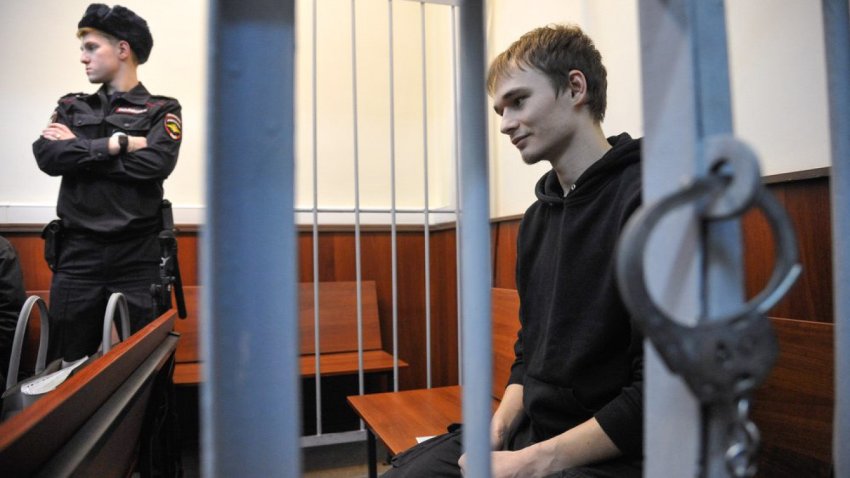
Russian anti-fascist activist Azat Miftakhov was arrested by FSB agents Sept. 4, immediately upon his release from a prison colony in Omutninsk. Azat had been in detention since February 2019, convicted in connection with the breaking of a window at a Moscow protest outside an office of the ruling United Russia party. At that time of that arrest Miftakhov was a mathematics graduate student at Moscow State University. Miftakhov endured torture, threats, and other mistreatment at the hands of authorities while imprisoned. After a trial marked by widespread judicial abuses and the use of “secret witnesses,” in January 2021 he was convicted of “hooliganism” and sentenced to five years in prison. He was released on parole two days after an International Day for the Liberation of Azat Miftakhov was held in cities around the world. But just as he exited the prison colony to meet his family, he was taken into custody again—this time on charges of “publicly justifying terrorism.”
The new charge concerns claims that Miftakhov spoke approvingly about a “terrorist act” in a conversation with two other prisoners in May of this year, after watching a TV news program. The act in question was apparently an attempted bombing of an FSB headquarters in Arkhangelsk in 2018. The new charge caries a sentence of up to seven years.
Authorities blamed the Arkhangelsk attack on the anarchist network People’s Self-Defense, which the “secret witnesses” in Miftakhov’s case had also linked him to. Correspondence supposedly linking Miftakhov to People’s Self-Defense was also said to have been found on an electronic device seized by the FSB in the search of his home of his home at the time of his arrest. This, along with a small amount of hashish confiscated in the raid, helped secure his conviction—although he was not charged with any drug offense. The drug stigma has been widely exploited in Russia to persecute dissidents.
According to Miftakhov’s wife Elena Gorban, the security services also circulated “intimate” photos of the mathematician in his prison, outing him to his fellow prisoners as bisexual—a clear attempt to expose him to violence.
An ethnic Tatar, originally from Kazan in the Tatarstan Republic, Miftakhov was working on his PhD at the time of his arrest in 2019. An online petition demanding his release has won nearly 100,000 signatures, and 50 members of the Russian Academy of Sciences have also signed a letter protesting his incarceration. Mathematical societies across Europe and the United States have issued statements in his support.
A statement on the website of the campaign for his release reads: “Azat Miftakhov is a brilliant young mathematician who came to embody the hopes of many for a free and democratic Russia. The new criminal case against him manufactured by the FSB is an outrageous travesty. These brutal Stalinist tactics must stop. Azat must be freed, immediately. The international mathematical community stands with him.”
See our last reports on the crackdown on dissent in Russia.
Photo: caseazatmiftakhov.org




